
More camcorder capers for the Jessops in Here We Go Composer knows the score for choir festival
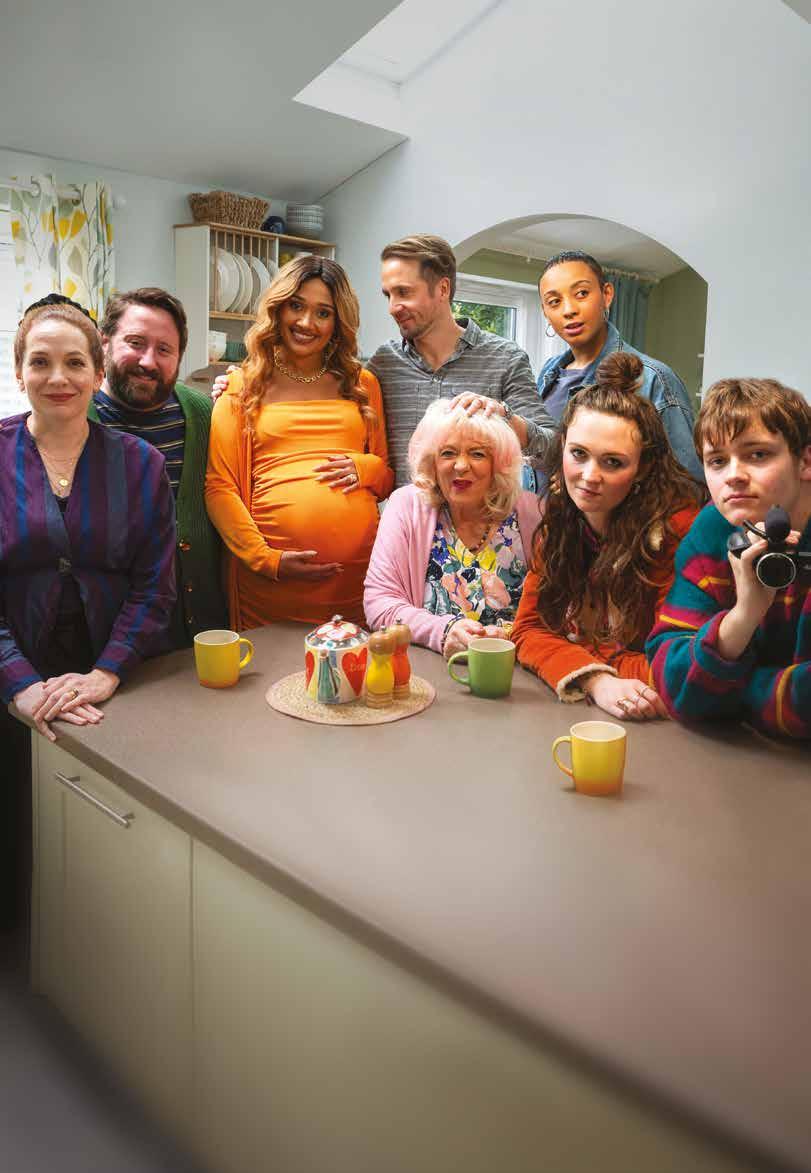


More camcorder capers for the Jessops in Here We Go Composer knows the score for choir festival

The Salvation Army is a Christian church and registered charity seeking to share the good news of Jesus and nurture committed followers of him. We also serve people without discrimination, care for creation and seek justice and reconciliation. We offer practical support and services in more than 700 centres throughout the UK. Go to salvationarmy.org.uk/find-a-church to find your nearest centre.
The Salvation Army first published a newspaper called the War Cry in London in December 1879, and we have continued to appear every week since then. Our name refers to our battle for people’s hearts and souls as we promote the positive impact of the Christian faith and The Salvation Army’s fight for greater social justice.
Editor: Andrew Stone, Major
Deputy Editor: Philip Halcrow
Staff Writer: Emily Bright
Staff Writer: Claire Brine
Staff Writer: Ewan Hall
Editorial Assistant: Linda McTurk
Graphic Designer: Mark Knight
Graphic Designer: Natalie Adkins
Email: warcry@salvationarmy.org.uk
The Salvation Army
United Kingdom and Ireland Territory 1 Champion Park London SE5 8FJ
Tel: 0845 634 0101
Subscriptions: 01933 445445 (option 1, option 1) or email: subscriptions@satcol.org
Founders: Catherine and William Booth
International leaders: General Lyndon Buckingham and Commissioner Bronwyn Buckingham Territorial leaders: Commissioners Jenine and Paul Main
Editor-in-Chief: Major Julian Watchorn
Published weekly by The Salvation Army
© The Salvation Army United Kingdom and Ireland Territory ISSN 0043-0226
The Salvation Army Trust is a registered charity. The charity number in England, Wales and Northern Ireland is 214779, in Scotland SC009359 and in the Republic of Ireland CHY6399.
Printed by CKN Print, Northampton, on sustainably sourced paper
Friends: if it hasn’t been your day, your week, your month or even your year, they’ll be there for you – so the Friends theme tune would have you believe. And perhaps the enduring popularity of the US sitcom confirms the value that many place on the people who can be closer than their own family.
In this week’s War Cry we find out more about the United Nations’ International Day of Friendship. The UN recognises friendship as a powerful tool that can promote lasting peace and a more united, compassionate world.
This force for good can be seen demonstrated in our article about Hope into Action, a charity that works in partnership with churches to purchase properties for vulnerable people and those experiencing homelessness.
To support tenants, Hope into Action provides them with an empowerment worker, who assists them in becoming independent. At the same time, the partnering church provides volunteers who offer friendship.
‘In some cases, the volunteers become a job reference, a next of kin or even the tenant’s emergency contact,’ says Kate Doran-Smith, Hope into Action’s head of delivery and training.
She describes how, despite sometimes initially having little in common with each other, the tenants and the church volunteers build natural friendships which can help the tenants overcome language and cultural challenges.
Offering the hand of friendship is something that Christians are encouraged to do by their faith. They note that Jesus told his followers that he regarded them as his friends – ones for whom he would sacrifice his own life.
And because Jesus died on a cross, taking the punishment for the wrong things that we do, and then was raised to life, even today we can experience his friendship. Having Jesus as a friend means that we can know his presence with us in every part of our lives, both now and in the future in Heaven.
If we accept his offer of friendship, we can have the assurance that Jesus will always be there for us.




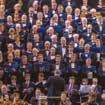



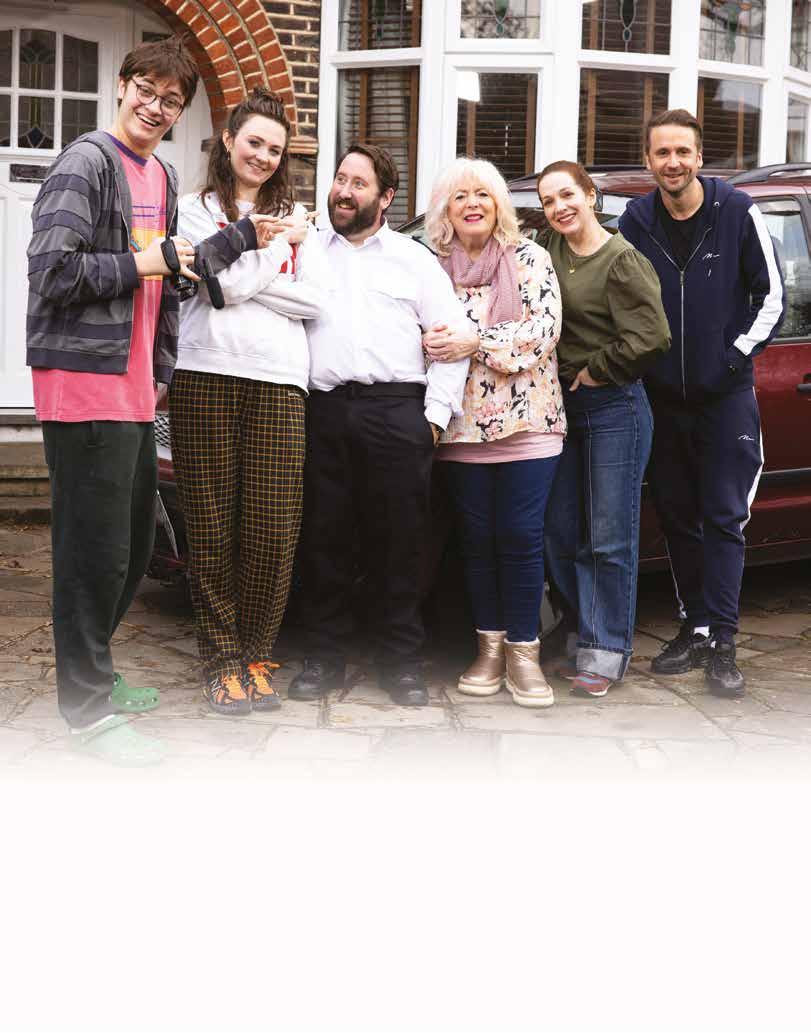
TV preview: Here We Go Fridays BBC1 and iPlayer
By Emily Bright
There is seemingly no escape for the Jessop family – grandmother Sue (Alison Steadman) has accidentally locked them in the house at the start of the third series of the mockumentary Here We Go
Ironically, being locked in holds up the family’s departure to an escape room. To mark their parents’ 25th wedding anniversary, teenager Sam (Jude Morgan-Collie) and twentysomething Amy (Freya Parks) had bought them a gift voucher for the activity. But first the Jessops have to solve how they’re going to leave their own house. Rachel’s brother Robin (Tom Basden) attempts to help, with disastrous results.
To make matters worse, a local crime wave occurs while they’re incarcerated, and dad Paul (Jim Howick) – as a relatively new policeman – is embarrassed that he’s unable to do anything about it. He’s reluctant to call his friends at work to explain his predicament and give the impression of being incompetent.
The day’s events aren’t exactly conducive to marital harmony either.
Paul was already in trouble with his wife, Rachel (Katherine Parkinson), because a week earlier he got her an anniversary present of an expensive barbecue – which only he wanted.
With all the mishaps, the family’s tensions rise. For better, for worse, the couple muddle through the aftermath of their anniversary.
The familial chaos continues in the second episode. Rachel is keen to befriend the potential new neighbours – fellow parents she met through Amy’s primary school – while Paul is determined to prove that he isn’t actually boring. But their attempts to impress the couple backfire spectacularly. The more Paul and Rachel dwell on their mistakes and try to change course, the more awkward their interactions with the couple become.
Part of the appeal of the Jessops, as they awkwardly blunder through life, is that they’re relatable. We all know what it is like to mess up – whether on a smaller scale or in a far more serious way. After all, making mistakes is part of being human.
While we may have to face the consequences of our messes in the

here and now, the good news is that we can find ultimate redemption through a relationship with God. If we ask him for any forgiveness, wisdom and support that we need, he can help us find a way forward into a more hopeful future.
One Bible passage reflects the experience of many people when it urges: ‘Hope in the Lord! For with the Lord there is steadfast love, and with him is plentiful redemption’ (Psalm 130:7 English Standard Version).
With God’s guidance, we can deal with any awkward or challenging situation we may face.
There’s no need to try hard to impress him – he already knows all our flaws, and loves us regardless. He’ll redeem our mistakes and help us to go again.
Claire Brine gives her take on a story that has caught the attention
Banknotes issued by the Bank of England are about to get their ‘first major redesign’ in more than 50 years – and members of the public are invited to help, reported the BBC.
The online article explained that ‘notable historical figures’ – such as Winston Churchill – have featured on banknotes since 1970, but the Bank of England is proposing that ‘the next series of notes could move on’ to explore new themes. Its suggested subjects include architecture and landmarks; arts, culture and sport; noteworthy events and movements in history; and nature (such as plants, animals or landscapes).
Allowing the public to put forward their own ideas ‘may prompt plenty of jokes’, said the BBC, but Victoria Cleland, the Bank of England’s chief cashier – whose signature appears on notes – was keen to see what suggestions came up.
‘Banknotes are more than just an important means of payment,’ she said. ‘They serve as a symbolic representation of our collective national identity.’
She added that, while she was keen to widen the choice of what could be featured on a note, the subject matter needed to be enduring.
After I’d finished reading the article, I started to think more deeply about identity – and, more specifically, my own. What images would represent me most effectively?
I suppose I’d choose pictures relating to things that I enjoy: a theatre, a Christmas tree, cake, the beach, novels. My notable figures would include my family, who have seen me through thick and thin.
But I would also want to include a picture of the cross that represents my Christian faith. The idea that there is a God who loves me has been a part of my life since I was born.
If I’m honest, faith doesn’t always come easily to me. Sometimes I feel a bit more doubtful than devoted. But God’s presence has endured throughout my life, bringing me purpose and shaping my perspective. His love affects how I live, what I say, what I do. I know that I can always bank on it.
Some of the Dead Sea Scrolls may be much older than previously thought, say researchers who used AI to analyse them.
Presenting their findings in the journal Plos One, the research team explained that the dating of the ancient artefacts, which include some of the oldest copies of texts from the Hebrew Scriptures, has previously been based primarily on the study of handwriting styles, which can be subjective, and radio-carbon dating of the physical scrolls, which requires a fragment to be destroyed in testing and which can also provide misleading results.
The researchers applied radio-carbon dating to a sample of scrolls and used this along with established handwriting styles to train a machine-learning tool – which they named Enoch – to predict the dates of 135 scrolls that had not undergone radio-carbon dating.
Some of the scrolls were found to be 50 to 100 years older than previously thought.
CNN reported researcher Mladen Popovic, of the University of Groningen in the Netherlands, as saying that a manuscript which contained verses from the Book of Ecclesiastes was previously dated to between 175BCE and 125BCE ‘but now Enoch suggests 300 to 240BCE’.
Responding to the research findings, Professor Charlotte Hempel of the University of Birmingham told CNN that the AI tool seemed to offer ‘a narrower window’ within the window provided by carbon dating. She said: ‘I wonder whether this suggests a higher level of precision, which would be extremely exciting.’
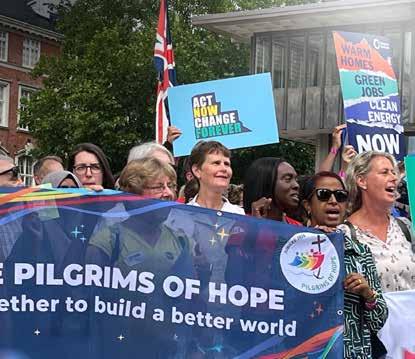
Members of The Salvation Army were among the 5,000 people who took part in a mass lobby of parliament to urge politicians to take action on climate change and protect nature.
At the event, co-ordinated by the Climate Coalition, representatives of various faiths and none met MPs and called on them to make commitments to fund communities most affected by climate change, restore nature and provide support for green jobs.
‘We have a duty to care for the only home that we have,’ said Major Heather Poxon, environmental officer for The Salvation Army, after the event, at which she met her MP, Daisy Cooper.
‘It’s also a justice issue. If we say that we love people, we need to show support by campaigning and lobbying our MPs so that they can make a difference in the lives of those who are most impacted.’
The Salvation Army in Addlestone is buzzing after two beehives were installed in the garden behind its charity shop.
Local beekeepers installed the hives, which will eventually be used for workshops and educational visits about beekeeping and sustainability.
Honey from the hives will be sold in the charity shop to raise funds for The Salvation Army’s work in the area.
Known as the Garden of Hope, the plot behind the charity shop provides people in the community with somewhere to sit quietly and hosts a gardening club on Monday mornings, where members grow fruit and vegetables.
Major Graham Bailey, co-leader of The Salvation Army’s Addlestone church, said: ‘Bees play such an important role and remind us that even the smallest creatures can make a huge impact. They also align with one of The Salvation Army’s mission priorities – to care for creation.’

Hives have been installed in Addlestone
n Horrible Histories was presented with a special award at the annual Sandford St Martin awards for religious, ethical and spiritual broadcasting.
Members of the cast and crew from the CBBC history series received the prize during a ceremony held at Lambeth Palace in London.
The special award was given in recognition of the way in which the programme had made an ‘extraordinary impact on how young audiences understand history, including what people believed’.
Horrible Histories episodes have included a portrayal of missionary Augustine as a ‘wizard’ converting Anglo-Saxons to Christianity and a song-and-dance routine to tell the story of 12th-century nun Hildegard von Bingen.
A sewing group which meets at the Salvation Army church in Atherton is alleviating period poverty by making sanitary packs for women and girls.
Members of the group are putting together 100 packs, each one containing eight washable sanitary pads, two shields, a washcloth or flannel, a bar of soap, two pairs of knickers, a carry pouch and a bag.
The Salvation Army plans to distribute the packs at food banks, schools, hostels for people experiencing homelessness and drop-ins through its existing services and through other organisations that it works with.
Captain Darron Boulton, leader of The Salvation Army in Atherton, said: ‘Our sewing group was passionate about not allowing women to suffer because they can’t afford or do not have access to period products.’
KATE DORAN-SMITH, head of delivery and training for Hope into Action, explains how the charity is working with churches and communities to offer people experiencing homelessness more that just a roof over their heads
Interview by Ewan Hall
As the UK continues to struggle with a housing crisis, many people feel that the idea of owning a home is nothing more than a dream. For people living on the street or in temporary accommodation, the idea of having a roof over their head or finding a place they can call home feels all but impossible.
Christian charity Hope into Action is trying to turn the hope of a home into reality. It partners with churches to purchase housing and provide personal support to vulnerable people and those experiencing homelessness.
‘Every home that we open is in partnership with a church, which means that the house is geographically close to the church building,’ explains Kate Doran-Smith, head of delivery and training at the charity. ‘We try to help all those who become homeless for
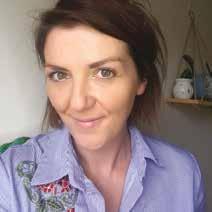
whatever reason. Rather than just giving handouts, it is a hand-up. It’s about empowering and supporting them until they can move on from the property.
‘Our first tenant was an ex-offender in Peterborough. We now house people with a whole range of support needs. They have all suffered homelessness and are often vulnerable people.
‘We work alongside local authorities to support our tenants, who could be struggling with addiction and recovery, mental health, finances or are fleeing domestic violence. Today, roughly a third of all our tenants are refugees or destitute asylum seekers. We’ve also got people who have exited the sex trade and people who have come out of modern-day slavery.’
To help its tenants process their problems and recover, Hope into Action provides them with an empowerment
worker. Like a support or care worker, the person assists the tenant to become independent by signing them on to benefits and helping them to get licences or even visas.
‘Because we provide these services,’ says Kate, ‘our partner churches are then able to do what they do best – love, befriend, offer community, offer a sense of belonging, and offer opportunities for the residents to give back through volunteering themselves.’
Kate also points out that a partner church does not need to be staffed by trained counsellors – just people wanting to offer friendship.
‘An empowerment worker in Peterborough was worried about one of the families being supported by a church,’ she says. ‘The refugee family only understood minimal English, so the church was struggling to connect with
them and build a relationship.
‘To try to build a connection, people from the church decided to go round to their house with some tools and sort out their garden.
‘As the church members tackled the garden, the mum came out and helped them all afternoon. Conversations slowly started and, by the end of the day, they had the foundation of a relationship which they could build on.’
When someone agrees to live in a Hope into Action home, they are expected to engage with their empowerment worker and the support of the volunteers from the churches. However, Kate has to ensure that everyone involved is realistic about the difference the support can make.
‘I have to manage my expectations,’ she says. ‘When I joined, I was a little naive to the approach, thinking I would
offer friendship to the tenant and that would help solve all their problems. I had this belief that within three weeks everything was going to work out and that the person would fit in with the church and be a part of it and never touch booze again.
‘Iwas
a bit overly hopeful. I am more realistic now, hoping for the best but preparing for the worst as we try to help others who are vulnerable.’
Despite Kate’s preparing for the worst, she has seen lives changed through the work of Hope into Action and its partner churches. She explains that sometimes tenants and their empowerment workers and the church
volunteers appear to have little in common, but they go on to build natural friendships.
‘In some cases, the volunteers become a job reference, a next of kin or even the tenant’s emergency contact,’ she says.
Since Kate joined Hope into Action in 2010, she has learnt to have faith in the people connected with the project.
‘Whether it is a church volunteer or a tenant on their fourth round of rehab, people’s willingness to be there for each other never ceases to surprise me,’ she says.
But Kate asserts that there is also another key factor in the success of work that is done.
‘God is ultimately in control of everything. He cares and loves those tenants more than I ever could. And I am just happy to do my bit.’
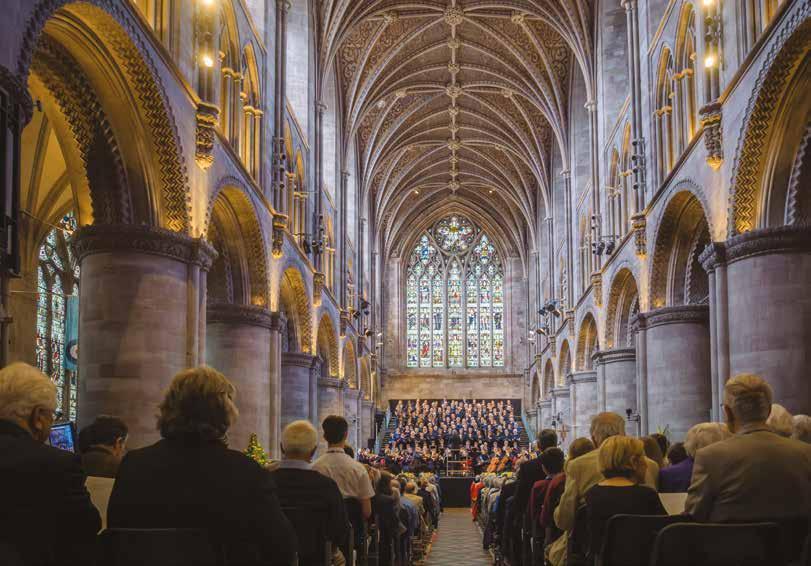

‘The cathedrals contribute to the concert experience,’ says DAVID FRANCIS, the chief executive officer of the annual Three Choirs Festival
Interview
by Philip Halcrow
he audience that gathers in Hereford a week from now for the finale of this year’s Three Choirs Festival will be about to hear a work that is – in the words of the festival’s chief executive officer, David Francis – a well-established choral piece that is considered ‘absolutely part of the repertoire’: Mendelssohn’s 1846
Elijah
‘But we have to remember,’ says David, ‘that Elijah was new when it was first performed at the Three Choirs Festival.’
The same, he points out, could also be said of, for instance, Handel’s Messiah, which predates Elijah by a century and which went on to become a ‘firm favourite’ at what is ‘certainly the longest-running classical music festival in
The Three Choirs Festival traces its origins
‘The lay clerks started getting together for what they called “meetings”, which were a coming together of the three choirs
of Gloucester, Hereford and Worcester,’ explains David.
The festival developed the pattern of visiting the three cities in turn.
‘The three cathedral choirs are still at the heart of the festival,’ says David. ‘They take part in evensongs during the festival, and they will be performing Alexander’s Feast by Handel in one of the concerts this year.’
But the festival also has other configurations of choirs, including a Festival Chorus made up of singers who audition to take part, and a Youth Chorus, who will be helping the festival keep up its tradition of not only highlighting but also premiering new works when they perform Bob Chilcott’s Mass for Peace and Reconciliation
‘The festival has a long tradition of associations with composers, which really comes from a time when the cathedral organists were often composers as well,’ says David. ‘Herbert Howells would be a great example, and one of his works, Hymnus Paradisi, which was premiered
David Francis

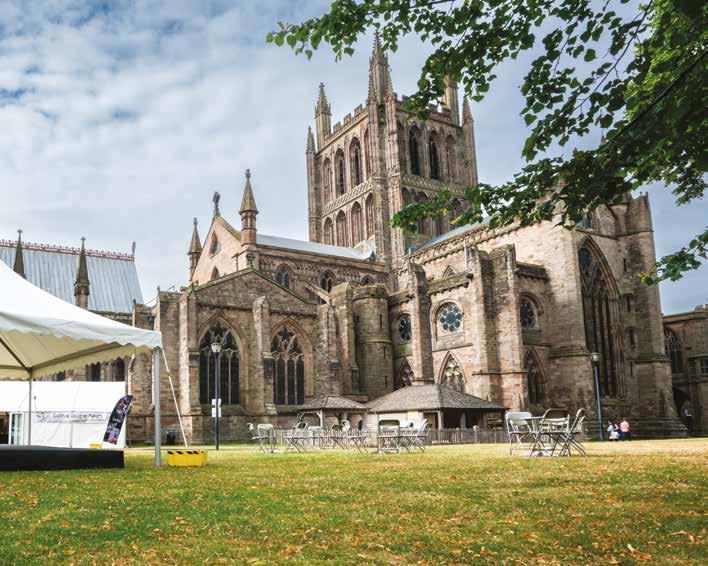
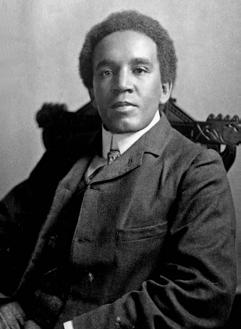
at the Three Choirs Festival, is being performed again this year.
‘Certainly in the early part of the 20th century there was a cohort of British composers that were closely associated with the festival – there was Elgar and Holst. And a very famous work by Vaughan Williams, Fantasia on a Theme by Thomas Tallis, was premiered at the Three Choirs.’
This year’s programme features another work that received its premiere at a previous festival. The Atonement by Samuel Coleridge-Taylor was first performed in Hereford in 1903. But it was neglected for decades, before an American academic rediscovered it and prepared a new edition.
‘Coleridge-Taylor was a mixed-race composer working at the turn of the 20th century, and he was championed by Elgar as a promising composer,’ says David. ‘He was quite unusual in lots of respects. He wrote in a kind of English Romantic idiom, but often took subject matter that wouldn’t necessarily be expected to sit comfortably in that tradition.
‘He had a number of commissions for the Three Choirs Festival which were successful, and then he was commissioned to write the oratorio The Atonement The libretto was written by a local woman, Alice Parsons, who was interesting because she was a suffragette, a
journalist and a Unitarian.
‘At the time it would have been convention when writing a piece like this –about the point at which Christ is crucified – to take an accepted translation of the Bible and use that as the text, but Alice chose to write a lot of her own original text based on the Bible story. It was quite a controversial thing to do at the time. ‘So even though the work is, I think, musically successful, people distanced themselves from it.’
You can hear a Haydn Mass with symphonic choir – for free
The work was subsequently disregarded. But then Bryan Ijames, an American professor, tracked down the original score in the library of the Royal College of Music and prepared a new edition, which will be performed at the festival in the year marking the 150th anniversary of Coleridge-Taylor’s birth.
David says: ‘Bryan Ijames has pointed out that actually nowadays we’re allowed to express our love for God in our own words and it’s not in any way offensive, so
if this libretto had been written now, it may have been accepted more.’
The theme of faith is not incidental to the festival, as David emphasises.
‘The Three Choirs Festival originated with cathedral choirs, and it is presented in cathedrals. And I think that – whether you have a faith or not – those cathedrals contribute to the concerts and festival experiences as much as the music itself.
‘We also have an opening service, a festival Eucharist and evensong throughout the week, and they are important not only from the cathedrals’ point of view but also for the festival organisers, because we can give sacred music a platform to audiences who may not always think of attending a Eucharist or evensong.
‘And, because those are services, people can attend them for free. So, for example, at this year’s festival Eucharist you can hear a full Haydn Mass in its authentic liturgical setting with symphonic choir and orchestra – for free.
‘The cathedrals and liturgy are part of the DNA of the festival. And because so much choral orchestral repertoire draws on biblical texts, as a concertgoer you’re almost certainly going to hear a biblical story.’
l The Three Choirs Festival runs at Hereford from 26 July to 2 August
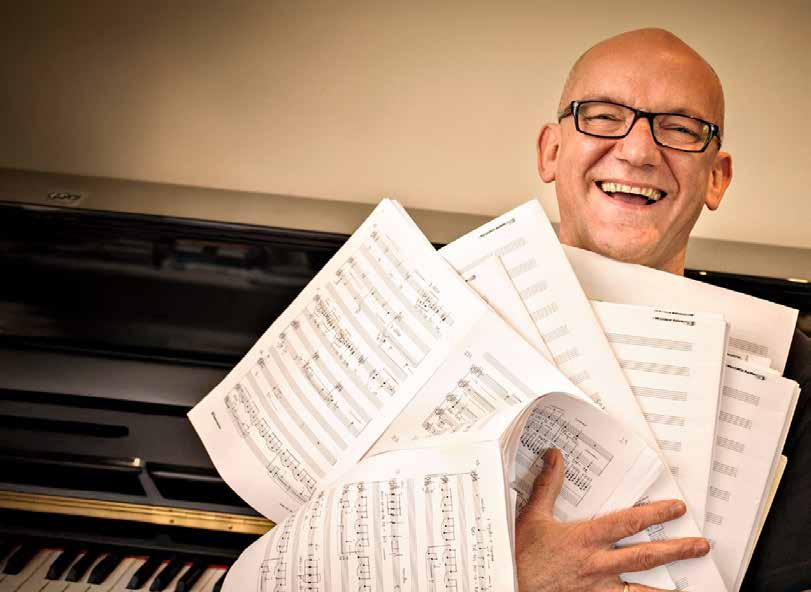
When he decided to write his new work –due to be premiered at the Three Choirs Festival – on the theme of peace in a world marked by conflict, composer BOB CHILCOTT turned to the Bible
Elgar, Holst and Vaughan Williams are among the notable composers whose works received premieres at the Three Choirs Festival. The fixture in the choral calendar – held each year in either Gloucester, Hereford or Worcester – often highlights new works, and one of a number of premieres this year is Mass for Peace and Reconciliation by Bob Chilcott.
It's not the first time Bob has had work performed at the festival – and a premiere from 2019 sticks in his mind.
‘I had an opportunity to write a piece for the Three Choirs Festival, which was in Gloucester that year,’ he says. ‘It was a Christmas Oratorio – the concert was later broadcast at Christmas, but I remember how we were performing it on the first day of August in boiling hot weather.’
The work that is to be premiered at this year’s event contains ‘a snippet’ of the Christmas story too. But the words spoken by the angels announcing the birth of Jesus are surrounded by contrasting sounds and words.
‘There’s a little bit of the Gloria – “Glory be to God on high, and on Earth peace, goodwill towards men”,’ explains Bob. ‘I used that as the get-out after all the texts about war.’
Bob says that he had wanted to explore such subject matter in his Mass for Peace and Reconciliation because he had been thinking about Haydn’s Mass in Time of War and because the supporter of Bob’s work who commissioned the piece was likewise ‘interested in this concept of a work that expressed peace at a time when there was so much conflict in the world’.
Having settled on the subject, Bob knew where he should turn for the words to go with the music.
‘I felt that any text I used had to come from the Bible,’ he says. ‘So I found a bunch of biblical texts that articulated peace. There are Jesus’ words from John’s Gospel, “Peace I leave with you, my peace I give unto you, not as the world giveth”, and his “Blessed are the peacemakers” from the Beatitudes. Then there are other well-known Bible texts,
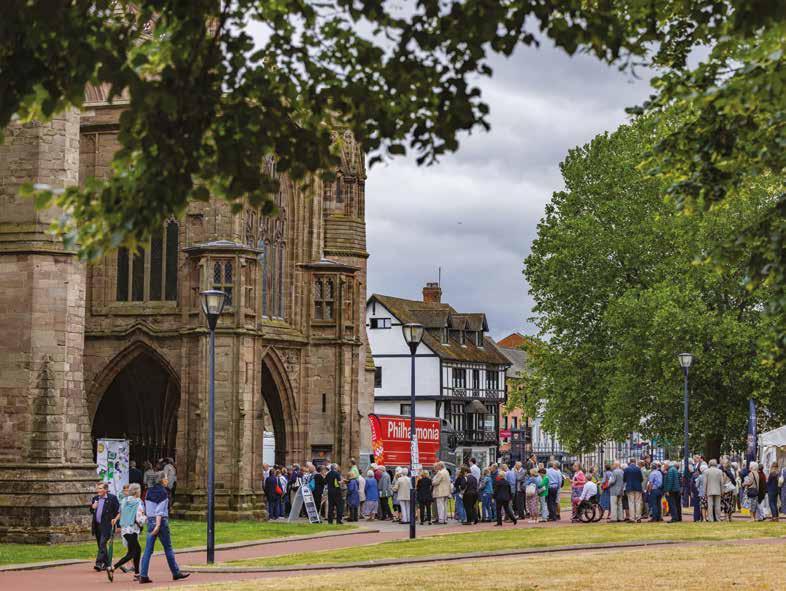
such as the passage about “the peace of God which passeth all understanding”.
‘But I decided I needed to find some texts about war as well. So I began trawling and found some powerful ones, such as the warning in Matthew’s Gospel, “You’ll hear of wars and rumours of wars, but see that you’re not troubled, because nation will rise against nation.”
‘Then there is this wonderful text in the Book of James, which says: “Why do you have wars? Why do you fight? It’s because you want something but don’t get what you want.” That seems absolutely right and seems to resonate with now.’
Bob explains that he has woven Bible texts in English with the Latin Mass texts for the piece. The voices – mezzosoprano Helen Charlston and the Three Choirs Festival Youth Chorus – are accompanied by organ, brass and timpani.
‘The Gloria is quite punchy, but the rest of it is a little bit more contemplative,’ says Bob, whose association with sacred music as a singer and composer
stretches back to childhood when he sang in a church choir.
He believes that being asked to write hymns for a setting of the Passion at Wells Cathedral in 2013 ‘suddenly helped define something’ for him: ‘that singing is really about people – who may or may not be good singers – coming together to do something for a particular purpose and sharing something uplifting’.
It’s a cry for help –knowing that there is something to help us
He says that his life ‘has been informed by the narrative that is alive in worship and by the language of liturgy’, that writing the Passion ‘actually changed my life a little bit – though I don’t really know how’ and that when he writes Christmas music he is sure that ‘the narrative, though old, is living’.
And he highlights a section in his new work and in many settings of the Mass
which ‘really hits home’ for him: the Agnus Dei, the Latin phrase referring to Jesus as ‘the Lamb of God’.
‘I’ve set the Mass text about seven or eight times, and for me the Agnus Dei text really lives. It’s a recognition that we’re human, and that actually we mess up the whole time. But it’s also saying to God: “You take away the sins of the world.”
‘It’s a cry for help. But it is also a cry, knowing that there is something there to help us.’
In writing the Mass for Peace and Reconciliation, Bob came across various types of conflict and peace in the biblical texts.
‘In many ways, wider things happen because of our inability to find peace within ourselves – and that’s the type of peace that I find to be the most powerful,’ he says. ‘If we took care of ourselves and those around us, maybe some of the outcomes would be different.’
l Mass for Peace and Reconciliation will be performed at the Three Choirs Festival on Monday (28 July)
The War Cry invites readers to send in requests for prayer, including the first names of individuals and details of their circumstances, for publication. Send your Prayerlink requests to warcry@salvationarmy.org.uk or to War Cry, 1 Champion Park, London SE5 8FJ. Mark your correspondence ‘Confidential’.
There is no set formula to becoming a Christian, but many people have found saying this prayer to be a helpful first step to a relationship with God
Like his fellow prophet Ezekiel, Daniel was taken into exile in Babylon. He is also similar inasmuch as his prophecies contain mysterious imagery. Many of his words are interpreted as relating to the end times. It is apocalyptic literature, similar to the New Testament’s final book, Revelation.
The Book of Daniel is divided into two sections. The first is an account of his experiences as a Jew in Babylon, and the second is a series of visions.
After Daniel interprets the dreams of the sleep-deprived King Nebuchadnezzar, he is made ruler and chief adviser (2:48). Nebuchadnezzar orders his people to bow down in front of a gold statue. When he hears that three of Daniel’s friends have refused to do so, he throws them into a fiery furnace. But they emerge unscathed, leading Nebuchadnezzar to declare that God is mighty, and prompting him to promote the three friends (chapter 3).
After his death, Nebuchadnezzar’s son, Belshazzar, holds a feast, during which his guests drink from goblets from the Jewish Temple. God is displeased. Suddenly a human hand appears and writes some mysterious words on the wall. Daniel interprets them. The writing is on the wall for Belshazzar. That night, he dies and Darius the Mede takes the throne (chapter 5).
Lord Jesus Christ,
I know that I have done things in my life that are wrong and I’m sorry. Thank you that I can ask you for forgiveness because of the sacrifice you made when you died on the cross.
Please forgive me and help me to live a better life in the future as I learn how to love you and follow your way of living.
Thank you, Lord Jesus.

If you’ve prayed this prayer, scan the QR code or contact us using the coupon on this page

For disobeying a prayer ban, Darius throws Daniel into a lions’ den. Like his friends before him, Daniel emerges unharmed and Darius acknowledges God (chapter 6).
Daniel describes three visions. The first contains four hybrid beasts, each representing a kingdom. He also sees a messianic ‘son of man’ (7:13), an eternal kingdom (7:18) and a judgement day (7:22).
Animals feature in his second vision. It relates to the countries of Media, Persia and Greece and is for ‘the time of the end’ (8:17) when ‘a master of intrigue’ (8:23) will fight the ‘Prince of princes’ (8:25).
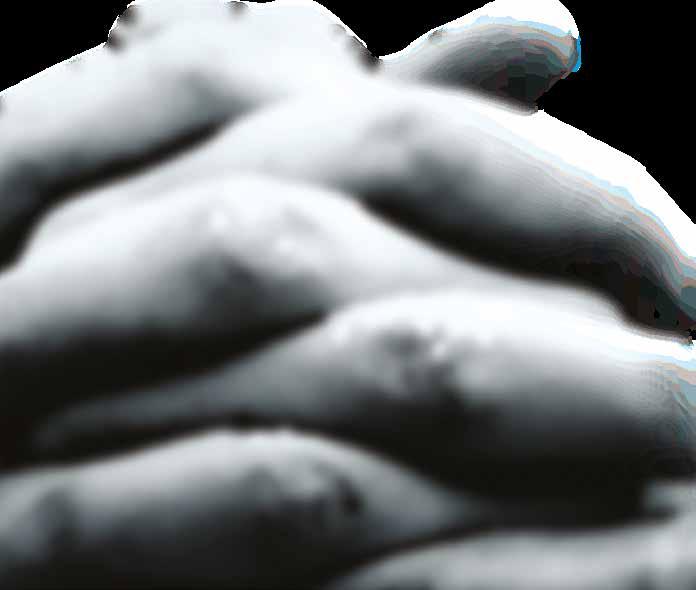
Daniel’s third vision is of a man with a message (chapters 10 to 12). The Persian Empire will be replaced by the Greek, which will split into four (11:2–4). Initiated by a proud king (11:36), there will be widespread war between north and south (11:40–45). God’s people will be rescued (12:1) and the dead will be raised, some to everlasting life (12:2).
The last vision attracts many interpretations. Some scholars think it refers to world history at the time of Daniel; some commentators regard it more as a future timetable for the Antichrist and the Second Coming.
To receive basic reading about Christianity and information about The Salvation Army, complete this coupon and send it to
War Cry
1 Champion Park London SE5 8FJ a
Address
Or email your name and postal address to warcry@salvationarmy.org.uk

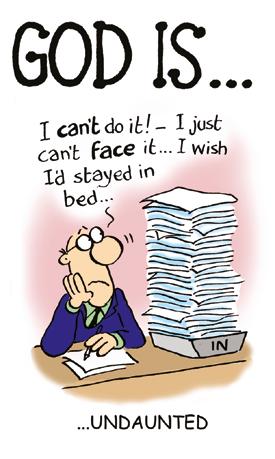
What is the title of actor and singer Ashley Walters’s new memoir?
Which three nations will host next year’s Fifa World Cup?
Who had a No 1 hit in 1983 with a cover version of ‘You Can’t Hurry Love’?
In which year was the TV competition Britain’s Got Talent first broadcast?
What is the two-digit international country code for phone calls to the UK?
Who played relocated London police officer Nicholas Angel in the 2007 film Hot Fuzz? 1

Feature by Ewan Hall
The Beatles (and later Wet Wet Wet) got by with a little help from their friends, and this Wednesday (30 July) the International Day of Friendship encourages people to celebrate the power of friendship and the significant difference it makes across the globe.
According to the United Nations, friendship is a powerful tool. And in 2011, the UN general assembly established the International Day of Friendship to promote lasting peace, stability and a more united, compassionate world.
Since its beginnings, the day has supported activities that encourage understanding, respect and healing. It was inspired by a Unesco proposal which defined a ‘culture of peace’ as a set of values and behaviours – such as open communication and sustainable living –that rejects violence and seeks to address the root cause of conflict.
While friendship may be a force for global peace and unity, it also plays a vital role in our everyday lives. Life seems better when we have friends who can share in our good times and be there when we face challenging situations.
Staying connected isn’t always easy. There can be times when people that we thought were our friends let us down – perhaps particularly when we need them most.
In moments when we feel alone, it’s good to know that we can find a reliable and constant friend in Jesus.
At a time when his followers were feeling uncertain about their future, he assured them: ‘You can be sure that I will be with you always. I will be with you until the end of time’ (Matthew 28:20 Easy English Bible).
Jesus promises that he will never let us down. If we accept his offer of friendship, it will bring us the help we need to face any situation.


ACROSS
1. Dread (4)
3. Acquire (3)
5. Talk (4)
7. Gathered (9) 9. Secure (4) 10. Cry (4)
11. Appended (5)
14. Medieval contest (5)
15. Adroit (5)
17. Entrails (5)
18. Inexperienced (5)
19. Kindle (5)
20. Before time (5)
23. Mineral (4)
25. Soon (4)
27. Competent (9)
28. Wound mark (4)
29. Drinking vessel (3)
30. Lazy (4)
1. Tumbled (4)
2. Hazard (4)
3. Avarice (5)
4. Furniture (5) 5. Masticate (4)
6. Excursion (4)

8. Cleaning agent (9) 11. Make amends (5)
Delay (5)
Dawdle (5)
Dance (3)
Small child (3)

Mendacious (5)
Fail to hit (4)
Distant (4)
Against (4)
Naked (4)
7. Assent (9) 21. Truism (5)


Orange. 1. Used to open door 2. Polite request 3. Limit the supply of
Angle where two sides meet
Disregard
Fruit
Ignore.

For the compote
400g mixed berries
For the sponge
4 eggs
100g caster sugar
100g gluten-free self-raising flour
For the frosting
130g baking margarine, softened
260g icing sugar
2tsp vanilla extract
For the topping
80g raspberries
80g strawberries
50g blueberries
½ lime, zest





Preheat the oven to 190C/Gas Mark 5. Grease a 33cm x 23cm tin and line with non-stick baking paper.
To make the compote, pour the berries into a pan over a low-to-medium heat. Bring to a simmer and continue to cook for 30 minutes, stirring regularly, until the fruit has broken down and the juices have thickened. Remove from the heat and leave to cool, then refrigerate until needed.
To make the sponge, crack the eggs into the bowl of a food mixer and add the caster sugar. Whisk on high speed for 5-7 minutes, or until very light and fluffy. Alternatively, mix with a handheld whisk. Sift the flour into the mixture and gently fold together, until just combined. Tip the sponge mixture into the lined tin and gently spread to the edge, ensuring the batter is even. Bake the sponge for 10 minutes, until risen, golden and set. Remove from the oven and leave to cool slightly for 5 minutes. Lift the sponge out of the tin with the paper and, without removing the paper, roll up the sponge gently and tightly along the long edge, then leave to cool completely.
To make the frosting, beat the margarine, icing sugar and vanilla extract together in a bowl, until light and fluffy.
To fill the sponge, carefully unroll it and spread 175g of the frosting over the top in a thin, even layer, followed by the compote.
Roll up the sponge again, this time peeling the paper off as you roll it.
To decorate the cake, spread the outside of the sponge with about 175g of the frosting in a thin, even layer. Put the remaining frosting into a piping bag and use it to draw 8 thin lines across the top to mark the portions.
Top each line with raspberries, strawberries and blueberries. Finally, sprinkle the lime zest over the top, to serve.
God leads me beside quiet waters, he refreshes my soul

Psalm 23:2 and 3